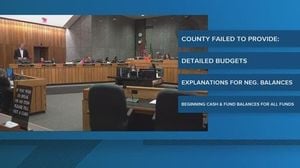On a crisp Friday morning in Manhattan, the courtroom buzzed with anticipation as Sean "Diddy" Combs, the iconic music mogul, made his way into the spotlight for his sentencing hearing. Wearing dark pants paired with a light-colored sweater over a crisp white button-down, Combs exuded a calm composure as he shook hands with his attorneys, hugged others, and offered a reassuring gesture to his family packed into the gallery’s second and third rows. The scene was a blend of celebrity, legal drama, and the unmistakable gravity of a life at a crossroads.
"Good morning judge," Combs greeted Judge Arun Subramanian, setting a tone of respect and formality as proceedings began. According to ABC News, Judge Subramanian acknowledged the extensive materials he had received in advance: a heartfelt letter from Combs himself, a video the defense intended to play, and an evaluation of a six-week course Combs had taught to fellow inmates at the Metropolitan Detention Center in Brooklyn (MDC-Brooklyn). Each piece, the judge noted, would weigh into his consideration of the sentence—an extraordinary mix of personal reflection and public scrutiny.
But the morning took an unexpected turn when it was announced that there would be no victim impact statements. The absence was due to the withdrawal of a former Combs assistant, known in court documents by the pseudonym "Mia." As reported by multiple outlets, including ABC News and Fox News, prosecutor Christie Slavik told the court, "This morning the government learned 'Mia' no longer wishes to address the court here today," adding that a "bullying" letter from the defense contributed to her decision. Judge Subramanian did not mince words, admonishing the defense: "The tone of the defense's letter was inappropriate. That should not be done again." The moment underscored the tense, high-stakes atmosphere surrounding the case and the delicate handling required for all involved.
Combs wasn’t alone in seeking to sway the court’s view. Two or three of his children, along with a pastor, were slated to speak ahead of the sentence. Defense attorney Brian Steel also noted that doctors who had evaluated Combs were on standby, ready to testify if needed. It was a full-court press from Combs’ side, hoping to paint a picture of a man changed by his time behind bars and the trials he’d endured.
The stakes couldn’t have been higher. According to ABC News, Combs faced sentencing on two counts of transportation for the purposes of prostitution—a conviction that stemmed from a July 2025 jury verdict. The jury found him guilty of transporting both his ex-girlfriend Cassie Ventura and another woman, identified as "Jane," across state lines and internationally for sexual performances with male escorts, events referred to in court as "freak-offs." However, Combs was acquitted of the more serious charges of racketeering conspiracy and sex trafficking by force, fraud, or coercion. The acquittals, while significant, did little to quell the fierce debate over the appropriate punishment for his actions.
Federal prosecutors argued that Combs deserved at least 11 years in prison, pointing to what they described as a pattern of violence and abuse that left victims in fear. As detailed in court filings and reported by ABC News, prosecutors cited security camera footage from a Los Angeles hotel that showed Combs assaulting Cassie Ventura. They asserted that the sentence should reflect "decades of unchecked violence" and "decades of psychological, emotional and physical damage he has inflicted." The prosecution’s case was clear: Combs, despite his acquittals on the most severe charges, should face a lengthy prison term due to the harm wrought by his actions.
The defense painted a starkly different portrait. Combs’ attorneys, in a filing referenced by ABC News, described their client as "an extraordinary person who has made monumental professional and personal contributions throughout his 55 years" and who, above all, wanted to reunite with his family. They recounted the devastating personal losses Combs had suffered: the deaths of his father, his best friend Christopher Wallace (better known as Notorious B.I.G.), the mother of four of his children Kim Porter, and more recently, his mentor Andre Harrell. These tragedies, the defense argued, led to years of substance abuse, anger, and anxiety—struggles that Combs had only begun to address seriously since his incarceration in September 2024.
In a letter submitted to the judge on October 2, 2025, Combs himself expressed deep remorse and a desire for redemption. "I want to apologize and say how sincerely sorry I am for all of the hurt and pain that I have caused others by my conduct. I take full responsibility and accountability for my past wrongs," he wrote. He went on to say, "I have been putting in the work and working diligently to become the best version of myself to ensure that I never make the same mistakes again." The letter, according to ABC News, was part of a broader defense narrative that emphasized Combs’ sobriety, his efforts at self-improvement, and his role as a mentor to other inmates.
Combs’ legal team also requested that a 15-minute video be played during the hearing. The video, as described by ABC News’ Aaron Katersky, featured Combs playing with his children, mourning Kim Porter, and delivering motivational speeches at New York fundraisers—a carefully curated montage meant to showcase the softer, more human side of the embattled star. The defense hoped this would help convince Judge Subramanian that Combs deserved imminent release. At the same time, the judge acknowledged having seen other video evidence that showed a far less flattering side of Combs, including the aforementioned assault on Cassie Ventura.
At the heart of the sentencing debate was the question of how much time Combs should serve. Federal prosecutors pressed for 11 years, citing the gravity of the offenses and the impact on victims. The defense countered with a request for a sentence of no more than 14 months—pointing out that Combs had already spent 12 months at MDC-Brooklyn, which would make him eligible for release by December 2025. The difference between the two recommendations was stark, reflecting the deep divisions over how to balance punishment, rehabilitation, and the role of celebrity in the justice system.
The courtroom drama played out not just in legal filings and arguments, but also in the personal appeals made by Combs and his supporters. According to Fox News coverage, Combs and his family made an emotional plea for freedom, underscoring the human cost of the proceedings. The presence of his children and pastor, ready to speak on his behalf, highlighted the personal stakes for everyone involved.
As Judge Subramanian prepared to deliver his decision, all eyes remained fixed on the courtroom. The case of Sean Combs—once known primarily for his musical genius and business acumen—had become a flashpoint for broader conversations about accountability, redemption, and the power dynamics at play in high-profile criminal trials. Whatever the outcome, the day marked a pivotal moment in the life of one of entertainment’s most storied figures, and a sobering reminder of the far-reaching consequences of fame, power, and personal choices.






